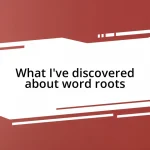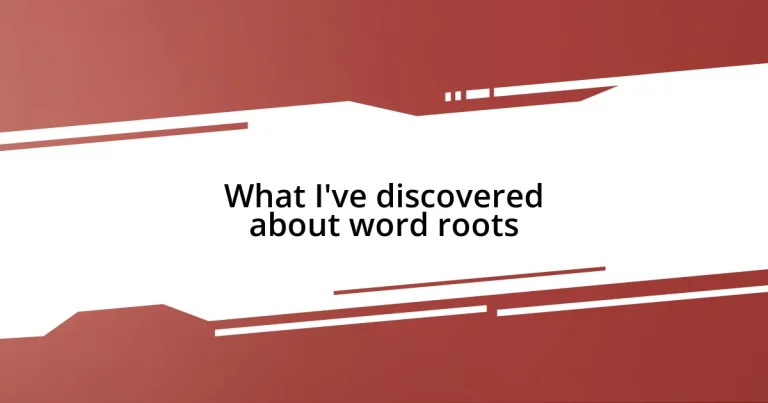Key takeaways:
- Understanding word roots enriches vocabulary and comprehension by connecting new words to familiar concepts.
- Recognizing prefixes and suffixes enhances communication and allows for nuanced meanings in language.
- Identifying word roots enhances the ability to deduce meanings of unfamiliar words, fostering confidence in language use.
- Resources like Etymonline, “Word Power Made Easy,” and vocabulary apps can aid in learning and exploring word origins effectively.
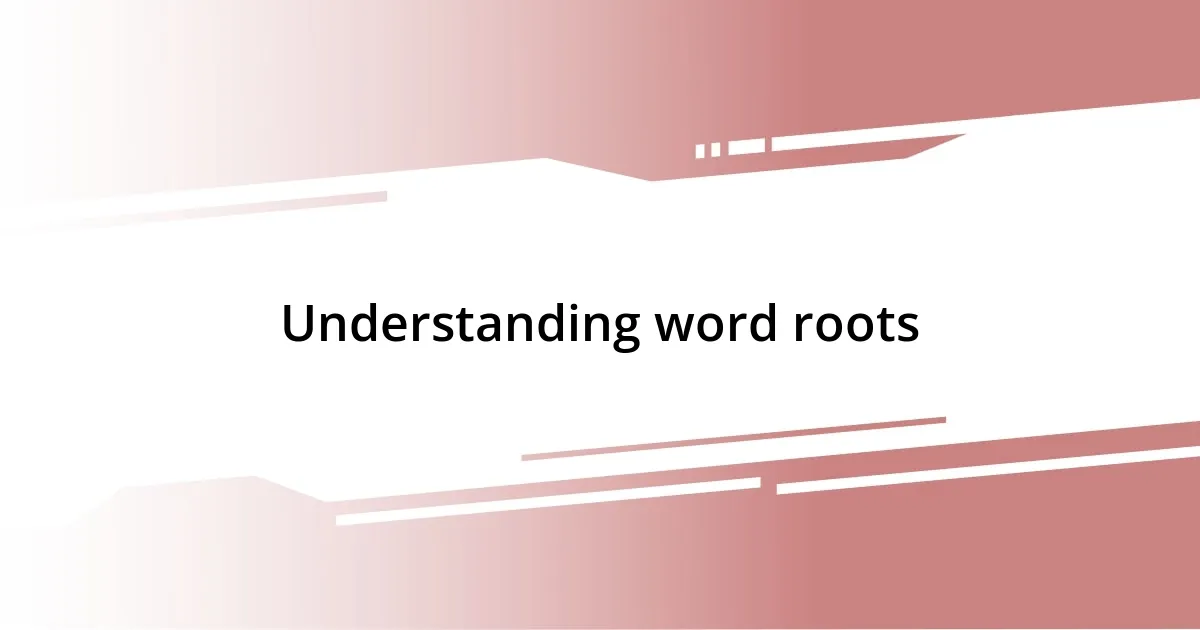
Understanding word roots
Understanding word roots can feel like uncovering hidden treasures buried within our language. I still remember the thrill I experienced when I first learned that the root “bio” means life; it opened up a world of words like “biology,” “biography,” and “biodegradable.” Isn’t it fascinating how just a small root can branch out into so many different meanings?
I find it amazing to think about how these roots connect us to the history of words. For instance, when I discovered that “phobia” comes from the Greek word for fear, I couldn’t help but connect it to my own experiences with anxiety. This understanding took a complex emotional situation and framed it in a way that felt more manageable. Have you ever wondered how knowing the root of a word can change your perception of it?
Every time I encounter a new word, I instinctively dig for its roots, and it feels like piecing together a puzzle. Recently, I stumbled upon “cred,” which means believe, and it made me reflect on trust and what it means in my life. As I explored words like “credit” and “incredible,” I realized that understanding their roots has truly deepened my appreciation for language—it feels like unlocking a door to deeper meanings we often take for granted.
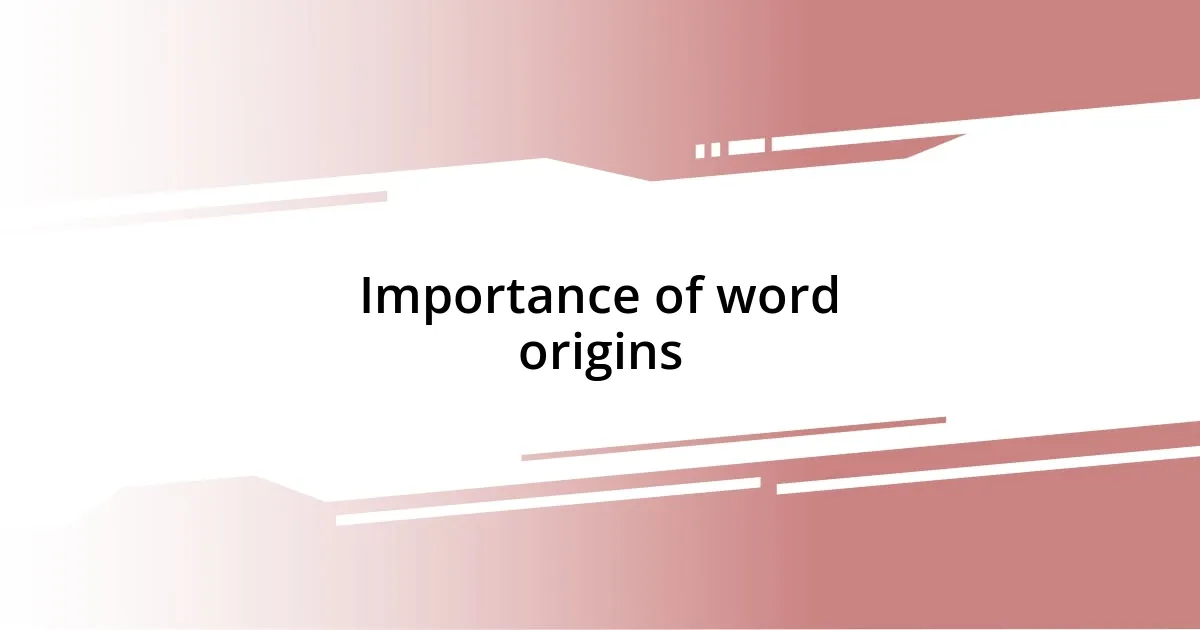
Importance of word origins
Understanding word origins is crucial because it enriches our vocabulary and enhances comprehension. When I first grasped that “aqua” means water, my appreciation for words like “aquarium” and “aquatic” blossomed. This knowledge transforms seemingly unrelated words into a cohesive narrative, allowing me to better grasp their meaning and context.
Here are some key reasons why knowing word origins matters:
- Deeper Understanding: It helps me connect new vocabulary with familiar concepts, making learning easier and more intuitive.
- Cultural Insights: I often find that exploring a word’s roots reveals fascinating aspects of history, culture, and philosophy.
- Nuanced Meanings: Familiarity with word origins allows me to navigate the subtleties in language, giving me a richer grasp of what I read or hear.
Each time I encounter a word and recall its origins, I feel more grounded in my understanding of language. It’s like embarking on a journey where every word has a story to tell.

Common prefixes and suffixes
I’ve noticed that prefixes and suffixes play a significant role in shaping the meaning of words. For instance, when I learned the prefix “un-,” which indicates negation, it felt like discovering a magic key that could flip the meaning of words upside down. Take “happy” for example; with a simple addition, it becomes “unhappy,” instantly conveying a completely different emotion. It’s incredible how tiny changes can have such a profound impact on our communication.
Suffixes, too, are just as powerful in expanding my understanding of language. The suffix “-ness” can transform adjectives into nouns, like when I came across “kind” becoming “kindness.” This revelation struck a chord with me, as it allowed me to articulate feelings and states I previously found difficult to express. Isn’t it amazing how these small linguistic components can encapsulate concepts we experience in our daily lives, making communication more nuanced?
Overall, I find that recognizing prefixes and suffixes helps me see relationships between words and ideas, enriching my vocabulary and comprehension. It’s like putting together a beautiful tapestry; each prefix and suffix adds its own unique thread to the overall picture, enhancing both the depth and clarity of our language.
| Prefix/Suffix | Meaning |
|---|---|
| un- | not |
| -ness | state or quality |
| pre- | before |
| -ful | full of |
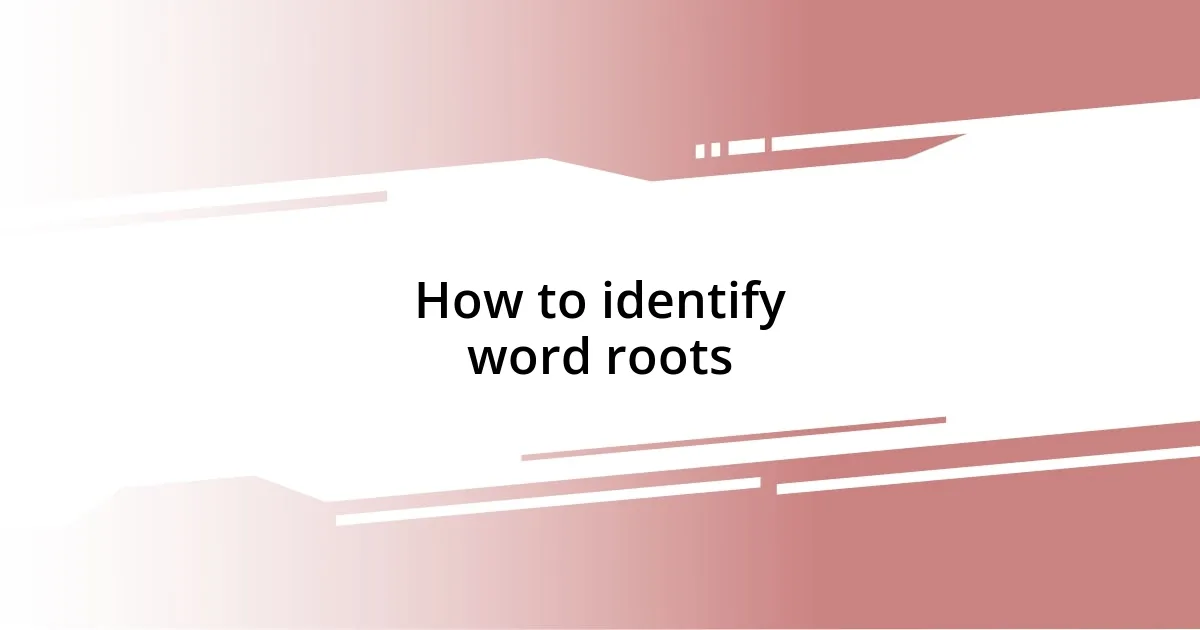
How to identify word roots
Identifying word roots can feel like detective work, and I love diving into it! Start by breaking words down into their parts. For instance, when I stumbled upon “benevolent,” I realized “bene” means good, and “volent” relates to wanting. This small exercise sparked a profound appreciation for how roots carry meaning, often reflecting feelings or actions that resonate with my daily life.
One way to sharpen my root-identification skills is to look for familiar patterns. When I see “tele” in words like “telephone,” I instinctively connect it to distance—knowing it means far off. Think about it: how does recognizing these patterns change your understanding of everyday terms? This connection to roots opens up a new dimension of language, turning the familiar into the fascinating.
I also enjoy consulting etymology dictionaries. The first time I did this, I traced the root of “psychology” back to the Greek word “psyche,” meaning soul or mind. Wow, what a revelation! This kind of exploration not only enhances my vocabulary but also adds layers of depth to my conversations. Each word becomes not just a label but a story, waiting to be uncovered.
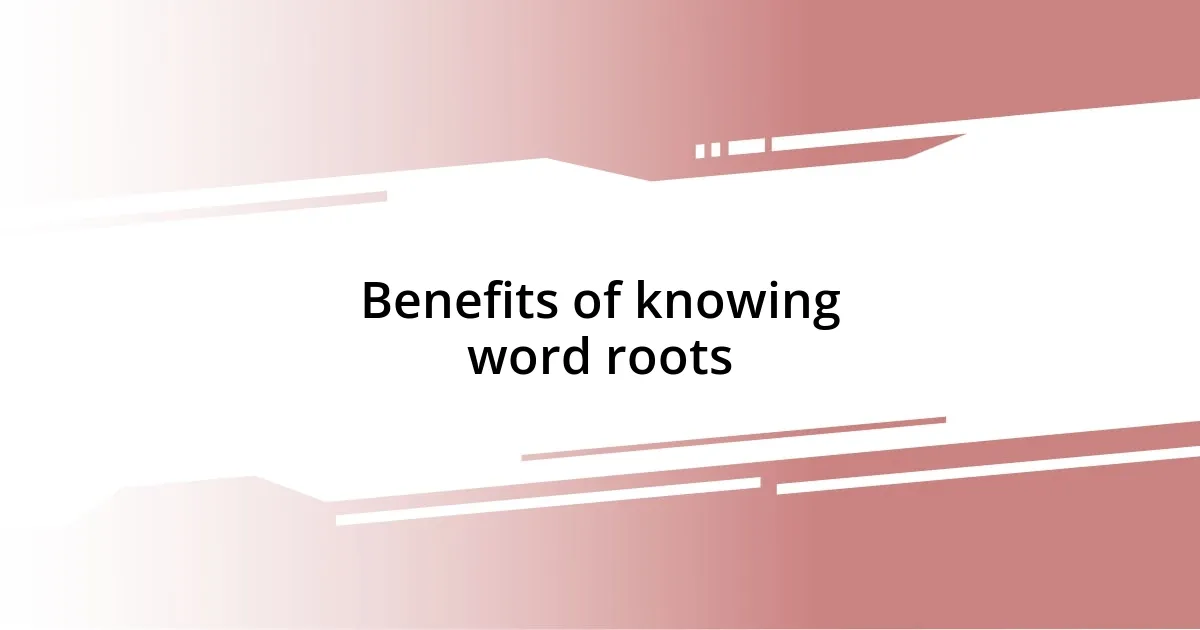
Benefits of knowing word roots
Understanding word roots is incredibly empowering. When I first grasped the concept that many English words are built on Latin and Greek roots, I felt like I’d discovered a secret map to navigate the language. For instance, knowing that “cred” means “to believe” opened the doors to words like “credible” and “incredible.” It was like connecting the dots, making me realize I could tackle new vocabulary with confidence.
Moreover, I’ve found that recognizing these roots significantly enhances my ability to guess the meanings of unfamiliar words. Picture this: I came across the term “auditory.” With my knowledge of “aud,” meaning hearing, I could deduce that it pertains to sound even before checking the definition. This skill has saved me countless hours in reading and studying, allowing me to engage more deeply with texts. Have you ever felt that sense of triumph when you figure out a word’s meaning just by its root? It’s immensely satisfying and fuels a love for language.
On top of that, knowing word roots fosters a richer understanding of language and culture. Each root carries with it a history that reflects the beliefs and practices of the people who spoke the language. For example, learning that “geo” relates to Earth has given me a broader perspective on words like “geography” and “geology.” It’s fascinating to see how these roots connect not just to definitions but to the very essence of human thought and history. Isn’t it wonderful how each new word can lead to a discovery about the world around us?
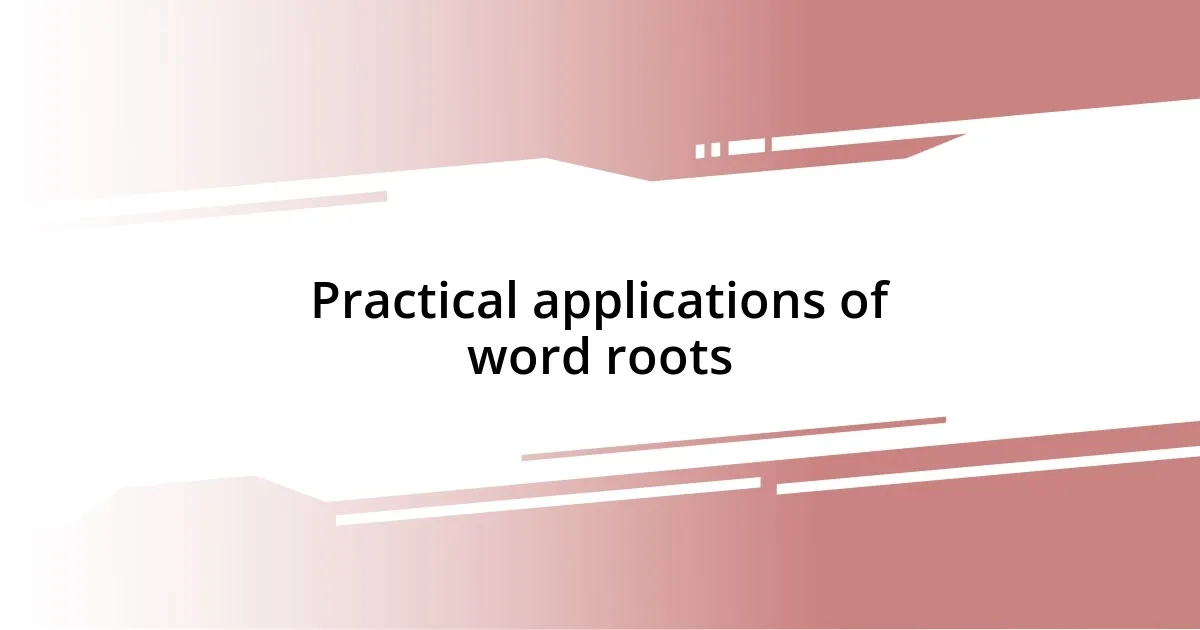
Practical applications of word roots
Understanding the practical applications of word roots opens up a treasure trove of possibilities for communication. I recall a time when I was tasked with giving a presentation at work, and I wanted to impress my audience. Armed with my knowledge of word roots, I chose specific terms like “photogenic” and “cognitive,” which not only sounded interesting but also hinted at deeper meanings. This approach engaged my colleagues and made the presentation far more impactful, highlighting how effective word choice can elevate our messages.
Moreover, knowing word roots has helped me in my writing. When I’m stuck on how to express an idea, I often delve into root meanings to inspire creative expressions. For instance, while working on a piece about environmental conservation, I relied on roots like “bio,” meaning life, to explore words like “biodiversity.” This connection ignited my passion for the subject, allowing me to convey my thoughts more vividly. Have you ever noticed how understanding the roots can help you articulate your ideas more clearly? It’s a game-changer!
I’ve also discovered that the knowledge of word roots can be incredibly valuable when learning new languages. When I began studying Spanish, understanding that “bio” also appears in the word “biología” made it easier to remember and relate concepts. This cross-linguistic awareness not only boosts my vocabulary but also enriches my linguistic journey. I often wonder, how transformative would language learning be if we all embraced the roots that unite our words? It’s an eye-opening experience that builds bridges across languages and cultures.

Resources for further learning
I’ve come across a few fantastic resources that can deepen your understanding of word roots. One of my favorites is the online tool, Etymonline. It’s like a treasure chest of word histories, revealing how roots inform the evolution of language. Have you ever thought about the journeys words make over time? Etymonline does a remarkable job showcasing how interconnected our vocabulary truly is.
Another resource I highly recommend is “Word Power Made Easy” by Norman Lewis. This book helped me grasp word roots in a systematic way. I remember working through its exercises, and each session felt like unlocking a new layer of my vocabulary. It’s not just about memorizing roots; it’s about applying them creatively. Have you ever wondered what narratives lie behind the words we use daily? This book invites you to explore that.
Lastly, there are several apps, like Quizlet, where you can find flashcards specifically focused on word roots. I enjoy using them during my downtime, and they make learning feel like a game. Have you experienced that rush of excitement when you ace a vocabulary quiz? These apps can enhance retention and make the process enjoyable, truly transforming how you approach new words.

